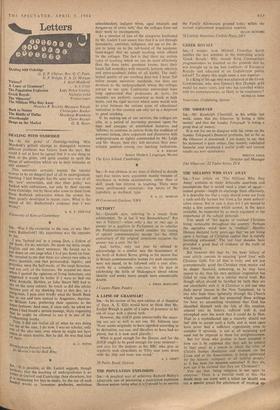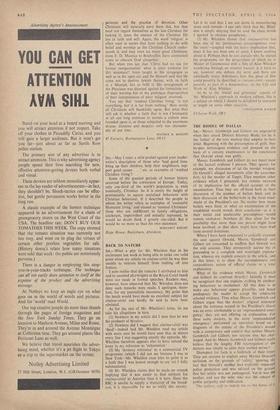THE MILLIONS WHO STAY AWAY SIR,—Your article on 'The Millions
Who Stay Away' contains so many debatable assertions and assumptions that it would need a letter of equal'— indeed greater—length to challenge them effectively. It is desirable too that a reply should come not from a rank-and-file layman but from a far more authori- tative source. But in case it does not I am moved to make a few comments which cannot, in the space available, be supported by as much argument as the importance of the subject demands.
You speak of 'the degree of residual Christian living, noticeable throughout the country.' Perhaps the operative word here is 'residual.' Hensley Henson declared forty years ago that 'we are living upon a heritage of Christian capital that is rapidly beconiing exhausted.' The last four decades have provided a good deal of evidence of the truth of this remark.
But however this may be, the, basic fallacy of your article consists in equating 'good lives' with Christian faith. For all that is truly, and not just conventionally, good the Christian must rejoice and be deeply thankful, lamenting, as he may have reason to do, that his own spiritual inspiration has failed to raise him to a similar moral level. But though ethics should be fortified by faith they are not identifiable with it. A Christian is not one who finds moral lessons in the New Testament; he is one who finds there (generally through the Church which assembled and has preserved these writings for him) an astonishing revelation that God has identified Himself with the fate of His creation, entered into its history, suffered with it, and triumphed over the worst that it could do to Him. That in a sophisticated age a majority should not feel able to accept such a faith, and in most cases have never had a sufficient opportunity even to consider it seriously, is not at all surprising and need 'not be imputed to them for unrighteousness.
But for those who profess to have accepted it how can it be supposed that they will be content to 'stay away' at a season in 'which the crisis of Christ's human desolation and triumph, on the Cross and at the Resurrection, is being celebrated by the historic 'company of all faithful people,' as it has been for nineteen centuries? If they do, how can it be claimed that they are 'Christians'? You say that 'being religious is not open to everyone.' There is a twofold truth in this. No doubt there are some with a talent (or should one say a special grace) for attainment of mystical( ei-
perience and the practice of devotion, Other Christians will naturally envy them this, but they need not regard themselves as the less Christian for lacking it, since the essence of the Christian life lies in faith and will. Again, the word 'religion' is often used in senses that have nothing to do with belief and worship as the Christian Church under- stands it, and may even (as many great Christians, from F. D. Maurice to Bonhoeffer, have contended) come to obscure God altogether.
But when you say that 'Christ had no use for formal reorganisation' what is your evidence for this statement? Jesus taught in the synagogue as well as in the open air, and He Himself said that He came not to destroy Jewish theism, with its faith in a Messiah, but to fulfil it. His arraignment of the Pharisees was directed against the formalism not of their worship but of the grotesque disproportion of their interpretation of what 'religion' involved.
You say that 'residual Christian living' is not everything, but it is far from nothing.' Here surely all Christians will thankfully agree. But what they wilt ask is whether a faith that is not Christianity at all can long continue to sustain a culture once founded upon it, or those subjected to the enormous strains, illusions and despairs only too character- stic of our time.
MAURICE B. RECKITT
47 Fairacre, Roehamplon Lane, SWJ5



































 Previous page
Previous page